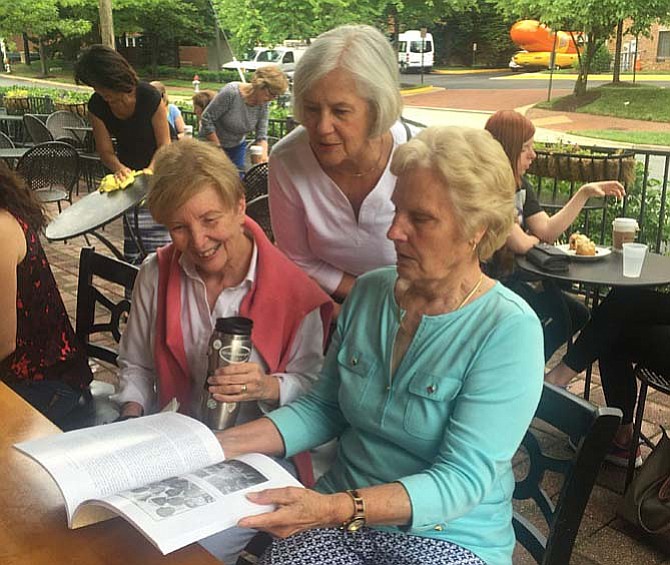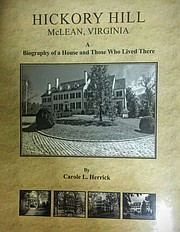Carole L. Herrick shows her new book, “Hickory Hill: McLean Virginia: A Biography of a House and Those Who Lived There” to friends Pam Lucey and Mary Ludden at Greenberry’s Coffee Co. in McLean. Photo by Ken Moore.
Robert F. Kennedy made McLean’s Hickory Hill part of national newspapers, often with a football.
“Up until this time, Hickory Hill was basically a magnificent white brick Georgian style home, situated near the nation’s capital city, in the countryside of McLean/Langley, Virginia,” writes historian Carole Herrick. “But after the Robert Kennedy family moved into the house, Hickory HIll suddenly became headlines in the national news.
“The youthful energy of the charismatic, athletic Kennedy clan put an imprint on the estate simply by the way they lived,” wrote Herrick, historian and author of “Hickory Hill, McLean, Virginia: A Biography of a House and Those Who Lived There.”
Hickory Hill was first built around 1870 near Langley Fork facing Chain Bridge Road on the site of a farmhouse that burned after the Civil War. Nine different families have lived at McLean’s Hickory Hill, named by owner George Franklin Means Walters for the old hickory trees that lined his semicircular driveway.
Attorney General Robert H. Jackson, for example, was appointed to the U.S. Supreme Court in 1941. He was the chief United States Prosecutor at the International Nuremberg Trial, “held for the purpose of dealing with Nazi war criminals and their war crimes against humanity,” according to one caption Herrick wrote.
Two pages earlier, Herrick includes a photo of Jackson “unveiling” the family buggy at Hickory Hill.
“During World War II gasoline was rationed. To save on gasoline, he often arrived for Sunday services at St. John’s Episcopal Church via horse and buggy,” she wrote.
“This house is significant to McLean, Virginia and the nation. The few things I had read about it were all the different, all the facts and everything were all different,” said Herrick. “We just needed to clean up the story because of its significance.”
Hickory Hill went on the market in 2003 with an asking price of $25 million; it remained on the market for six years (with a few price reductions) before Alan and Ashley Dabbiere purchased the historic home on Dec. 31, 2009 for $8.2 million through the Hickory Hill Trust.
“The Dabbieres were especially pleased that they were able to purchase the property as opposed to a developer with visions of subdividing the land,” wrote Herrick.
WIMBLEDON ALSO KNOWS Herrick.
Herrick was a nationally ranked tennis player, who played at Wimbledon.
In 2012, she was inducted into the National Women’s Collegiate Tennis Hall of Fame.
“It just needed to be written,” said Carole Herrick, a McLean resident and author of eight books, six about McLean.
Herrick chairs the Fairfax County History Commission, which helps to identify, document, record and preserve the county’s historic past.
“WHAT WENT ON in this house is unbelievable,” she said during an interview at Greenberry’s Coffee Co. in McLean, where she is a regular.
In addition to tracking the nine owners who made their homes there, she also includes historical facts, vignettes, and financial figures.
President John F. Kennedy became a McLean resident shortly after becoming Senator from Massachusetts. He purchased Hickory Hill and estate from the widow of Justice Robert Jackson in 1955, according to her research. After Kennedy was unsuccessful getting the Democratic vice presidential nomination in 1956, he transferred Hickory Hill to his brother, Robert.
Ethel and Robert Kennedy were at Hickory Hill the afternoon of Nov. 22, 1963, when President Kennedy was assassinated in Dallas, Texas.
“Bobby was having lunch by the swimming pool when he received a phone call from J. Edgar Hoover that his brother had been shot,” Herrick wrote.
“Bobby did not leave Hickory HIll at that time, but instead walked the grounds in reflective thought with two of his dogs, Brumus and Rusty.”
ETHEL KENNEDY enlarged Hickory HIll in 1963 to a structure with 13 bedrooms, 10 bathrooms (seven full size), seven fireplaces, an Olympic-size swimming pool, a children’s pool and a pool house that included a kitchen with his and hers bathrooms, according to Herrick.
“A reptile house was built in the basement as a birthday present for Bobby, Jr.,” she researched.
Ethel Kennedy put Hickory Hill up for sale in 2003 before Alan and Ashley Dabbiere purchased the historic home on Dec. 31, 2009 for $8.2 million.
In 2010, they began a three-year project to renovate the house, working with John Milner Architects, Herrick cites, as being “a well-known firm experienced in historic preservation and restoration construction.”
In 2015, the Dabbieres, with support from the National Brain Tumor Society, raised $1 million for “The Grey Soiree,” to help raise awareness and resources to find better treatment and a cure for brain tumors. Sheryl Crow performed.
“They relish the history of the property. They recognize that their residence is a significant part of the area’s heritage,” according to Herrick.
OTHER BOOKS: “Ambitious Failure: Chain Bridge, the First Bridge Across the Potomac River;” “August 24, 1814: Washington in Flames;” “A Chronological History of McLean, Virginia;” “Yesterday: 100 Recollections of McLean and Great Falls, Virginia;” “Additional Recollections of McLean and Great Falls, Virginia;” “Images of America: McLean;” and “Legendary Locals of McLean.”
Books can also be found in McLean at Mesmeralda's, McLean Hardware, Flowers and Plants and Gathered Stems and on Amazon.

